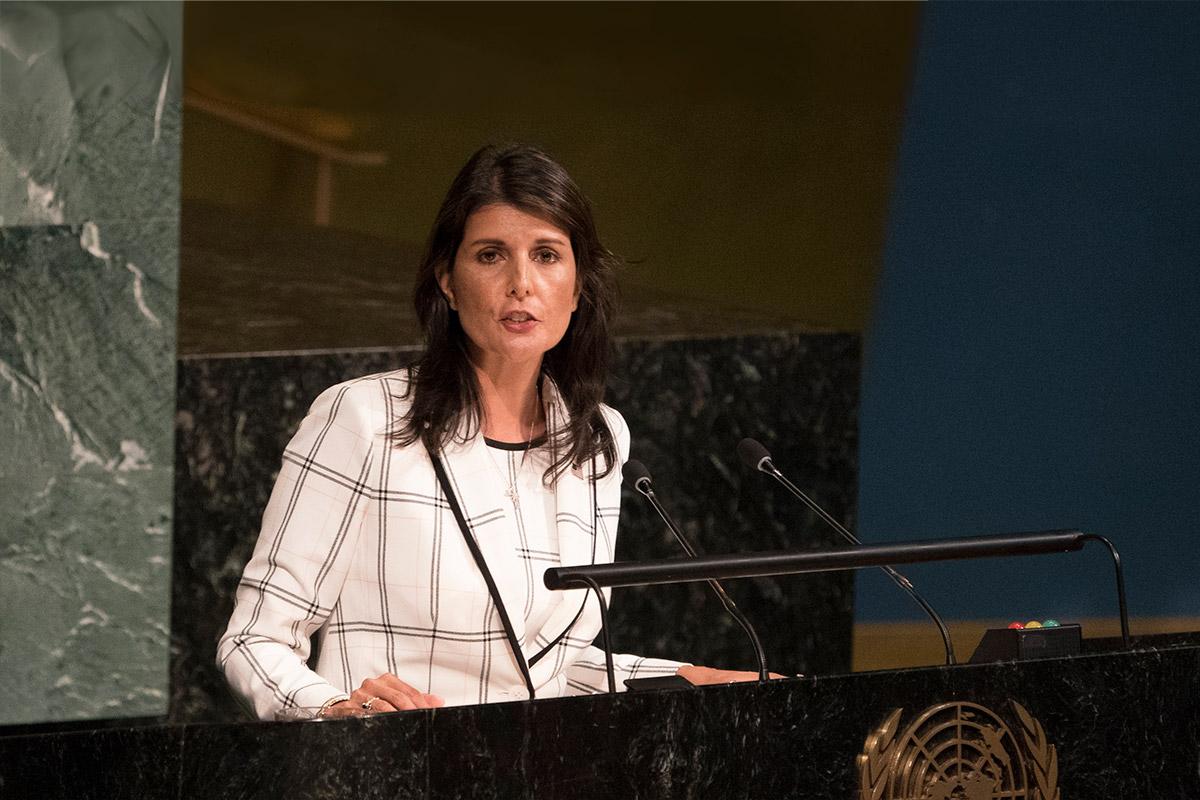The Trump administration withdrew from the United Nations (UN) Human Rights Council on Tuesday, making good on a pledge to leave a body it accused of hypocrisy and bias against Israel.
“For too long, the Human Rights Council has been a protector of human rights abusers, and a cesspool of political bias,” Nikki Haley, the American ambassador to the UN, said Tuesday at the State Department in Washington. She said the decision was an affirmation of the United States’ (US) respect for human rights, a commitment that “does not allow us to remain a part of a hypocritical and self-serving organization that makes a mockery of human rights.”
The 47-member council, created in 2006 and based in Geneva, began its latest session on Monday with a broadside against President Donald Trump’s immigration policy by the UN’s high commissioner for human rights, Zeid Ra’ad al-Hussein. He called the policy of separating children from parents illegally crossing the southern border of the US “unconscionable.”
The Trump administration is under intense criticism from business groups, human rights organizations and lawmakers from both parties over the recently imposed policy.
In the works
While the timing was jarring, the US withdrawal had been in the works for some time and reflects broader scepticism among conservatives toward it. National Security Adviser John Bolton had opposed the body’s creation when he was US ambassador to the UN in 2006.
Haley warned a year ago that the US would pull out if the council didn’t address what she saw as its bias toward Israel and the fact that many of its current members – they include China, Saudi Arabia and Egypt – have poor human rights records themselves.
Haley took the lead on the decision Tuesday, as was made plain by the choreography of the announcement. Secretary of State Mike Pompeo delivered brief remarks before she spoke, praising Haley and leaving it to her to announce the withdrawal.
Condemning the move, Senator Chris Coons of Delaware, a Democrat who serves on the Foreign Relations Committee, said the decision “sends a clear message that the Trump administration does not intend to lead the world when it comes to human rights.”
The withdrawal was met with praise from Republican lawmakers including Senator Lindsey Graham of South Carolina and from Israeli Prime Minister Benjamin Netanyahu.
United Nations spokesman Stephane Dujarric said Secretary General Antonio Guterres “would have much preferred for the United States to remain” a member.
Decent track record
“It’s an imperfect body but it has a decent track record,” said Stephen Pomper, director of US programs at the International Crisis Group and a former National Security Council director under President Barack Obama. “It could get better, but it stands a worse chance of doing so if the US takes its ball and goes home and allows it to become a playground for strongmen.”
The council also has been a forum for criticism of Trump’s economic policies. In a report on the US due to be submitted to the Human Rights Council this week, Philip Alston, the UN’s envoy on poverty, said the president’s tax overhaul “overwhelmingly benefited the wealthy and worsened inequality.”
The report says that while the US has long been the most unequal among developed nations, it’s getting worse. “The policies pursued over the past year seem deliberately designed to remove basic protections from the poorest,” it said.
Calls to revamp
Even some critics of the Human Rights Council have called for continuing to push for a revamping of the body rather than quitting it. They argue that nations championing human rights are better able to counter members with poor track records by remaining involved with the body.
On the opening day of the council’s current session, British Foreign Secretary Boris Johnson criticized the body’s perennial agenda item dedicated to Israel and the Palestinian territories, calling it “damaging to the cause of peace.” Nonetheless, he said the United Kingdom wasn’t “blind to the value of this council.”
The council is scheduled to discuss Israel and the Palestinian territories on 2 July, according to its agenda. – Bloomberg
